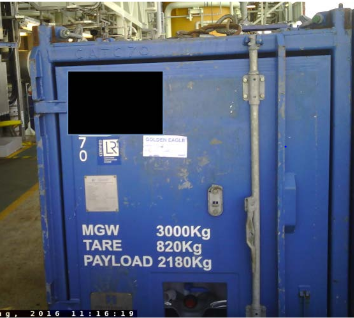CCU door unlatched whilst being lifted from PSV to platform
The MSF has published a safety alert regarding an incident in which the door on a cargo carrying unit (CCU) unlatched during lifting operations. The incident occurred when an IBC carrier was being stowed on-board a PSV. As with the rest of the cargo, the door had been closed and secured with a tie-wrap prior to shipment. As the container was being lifted across the installation, it was observed that the door handle had unlatched. On opening the IBC carrier, it was identified that the IBC itself had not been secured within the carrier.

On further investigation, it was determined that the IBC carrier was of inadequate design. There were no securing points within the unit to enable the IBC to be secured and externally there were no buffers to prevent the door handle from being snagged by other cargo. It would have been possible for the IBC to have shifted internally creating sufficient force to open the IBC carrier door, with the result that the IBC may have fallen out during lifting operations from the platform.
The full MSF alert can be found atmarinesafetyforum.org/images/msf-safety-alert-16.18.pdf.
Further information on CCU packing and handling can be obtained from http://onshoreoffshorecargo.com.
Members may wish to refer to the following incidents (search words: door, cargo, lifting):
- Loading and securing of cargo
- Incidents involving poor crane operations (7th bullet point).
Safety Event
Published: 24 October 2016
Download: IMCA SF 29/16
IMCA Safety Flashes
Submit a Report
IMCA Safety Flashes summarise key safety matters and incidents, allowing lessons to be more easily learnt for the benefit of all. The effectiveness of the IMCA Safety Flash system depends on Members sharing information and so avoiding repeat incidents. Please consider adding safetyreports@imca-int.com to your internal distribution list for safety alerts or manually submitting information on incidents you consider may be relevant. All information is anonymised or sanitised, as appropriate.
IMCA’s store terms and conditions (https://www.imca-int.com/legal-notices/terms/) apply to all downloads from IMCA’s website, including this document.
IMCA makes every effort to ensure the accuracy and reliability of the data contained in the documents it publishes, but IMCA shall not be liable for any guidance and/or recommendation and/or statement herein contained. The information contained in this document does not fulfil or replace any individual’s or Member's legal, regulatory or other duties or obligations in respect of their operations. Individuals and Members remain solely responsible for the safe, lawful and proper conduct of their operations.
